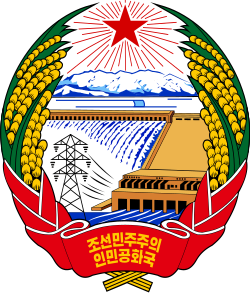| Socialist Patriotic Youth League 사회주의애국청년동맹 | |
|---|---|
 Emblem | |
 Flag | |
| Chairman | Mun Chol |
| Founded |
|
| Headquarters | Pyongyang, North Korea |
| Ideology | Communism Kimilsungism–Kimjongilism Korean nationalism |
| Mother party | Workers' Party of Korea |
| International affiliation | World Federation of Democratic Youth (WFDY) |
| Newspaper | Chongnyon Jonwi |
| Website | youth |
| Socialist Patriotic Youth League | |
| Chosŏn'gŭl | 사회주의애국청년동맹 |
|---|---|
| Hancha | 社會主義愛國靑年同盟 |
| Revised Romanization | Sahoejuuiaegukcheongnyeondongmaeng |
| McCune–Reischauer | Sahoejuŭiaegukch'ŏngnyŏndongmaeng |
 |
|---|
The Socialist Patriotic Youth League is the main North Korean youth organization. Directly under the party Central Committee, it is the only mass organization expressly mentioned in the charter of the Workers' Party of Korea.[ not verified in body ]
Contents
The organization, modeled after the Komsomol in the former Soviet Union, includes all North Koreans without party membership between the ages of 15 and 30, although married women who opt to become housewives are transferred to the Socialist Women's Union. [1] Youth under 15 may join the Korean Children's Union, itself a part of the larger Korean Children's Union. Officially, the guiding ideology of the organization is Kimilsungism–Kimjongilism. [2]